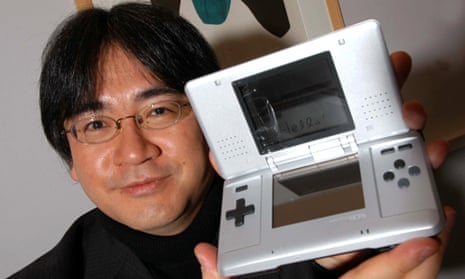Satoru Iwata, who has died aged 55 of a bile duct tumour, was that rarest of beasts: the president and CEO of a giant company who retained the human touch and nurtured a relationship with his consumers that felt personal. As the man who had held the reins at the colossal video games company Nintendo since 2002, he did more than anyone else to bring video games to a mainstream, family audience. He presided over the launches of the Nintendo DS handheld gaming system – the second-most successful console to date, after Sony’s PlayStation 2 – and the Nintendo Wii, with its innovative, much-copied motion-sensing, TV remote-style controller, which appealed to a generation that had previously found video games intimidating.
Genial, approachable and solicitous in person, and always with a humorous glint in his eye, Iwata never conformed to the stereotype of the haughty CEO – although he was forced to take plenty of tough decisions in the harsh Japanese corporate world, where shareholders’ responses to quarterly results hold sway and losing face is not an option. Uniquely among CEOs of the games industry’s leading players, he began his working life as a programmer, and retained a lifelong enthusiasm for making and playing games.
In recent years, he had established a means of communicating that enthusiasm to Nintendo’s large and devoted following, via monthly web-based videos entitled Nintendo Direct (in which, often against cartoon backdrops or even in full cartoon form, he would regularly perform knockabout routines with Nintendo’s US president and CEO Reggie Fils-Aimé and the company’s game designer Shigeru Miyamoto).
In recent years, Iwata had to negotiate some troublesome ship-steadying exercises: Nintendo’s latest console, the Wii U, failed to achieve sales targets, but Nintendo responded quickly, unexpectedly announcing earlier this year that it is working on a successor, code-named NX. The 3DS handheld, though, continues to sell well, despite dire predictions at its 2011 launch that it would fail to compete with gaming on mobile phones.
And Iwata, originally reluctant to jeopardise Nintendo’s handheld console business by entering the mobile phone gaming market, earlier this year carved out a crucial deal with the Japanese mobile gaming giant DeNA, which will see Nintendo develop original games for mobile phones based on its much-loved array of characters, without impinging on its cherished back-catalogue. Faced with shareholder demands to cut staffing in 2013, Iwata dug in his heels, arguing that reduced morale would lead to lower-quality games, and took a personal 50% pay cut.
Iwata showed early programming prowess: at school in Sapporo, the northern Japanese city where he was born, he created simple number games on a programmable calculator. Following a computer science degree in Tokyo, he joined the games developer HAL Laboratory, coding and producing games including EarthBound, Balloon Fight and the Kirby franchise. He also coded the prototype of what would become Super Smash Bros, one of Nintendo’s most enduring and successful franchises.
Iwata was promoted to president of HAL Laboratory in 1993, and turned the company’s finances around, before joining Nintendo in 2000, as head of corporate planning. In 2002, he succeeded Hiroshi Yamauchi as president of Nintendo – Yamauchi had run the company since 1949, and Iwata was the first president with no blood-ties to the Yamauchi family.
Iwata set about dragging Nintendo into the 21st century: its GameCube console was struggling, but the innovative dual-screen handheld, the DS, introduced in 2004, proved a smash-hit, and in 2006 the Wii consolidated Nintendo’s return to the pinnacle of the games industry.
After he instituted the Nintendo Direct videos in 2011, and recorded a number of incisive, albeit jolly, interviews with games developers under the title “Iwata Asks”, Nintendo’s fans felt they had developed an almost personal connection with their favourite company’s president and CEO. Although in 2014 he missed E3 – the games industry’s most important showcase – through illness, Iwata’s death was unexpected, and triggered an outpouring of tributes on social media.
Two quotes sum up Iwata’s approach to the games industry. He zealously maintained Nintendo’s focus on child- and family-friendly video games, keeping the company out of the technological arms race in which the rival console manufacturers Sony and Microsoft remain engaged, by following the philosophy that “engineering is not quite as important as imagination.” But his best-known statement was delivered at the Game Developers Conference in 2005: “On my business card I am a corporate president. In my mind, I am a game developer. But in my heart, I am a gamer.”
Iwata is survived by his wife, Kayoko.

Comments (…)
Sign in or create your Guardian account to join the discussion